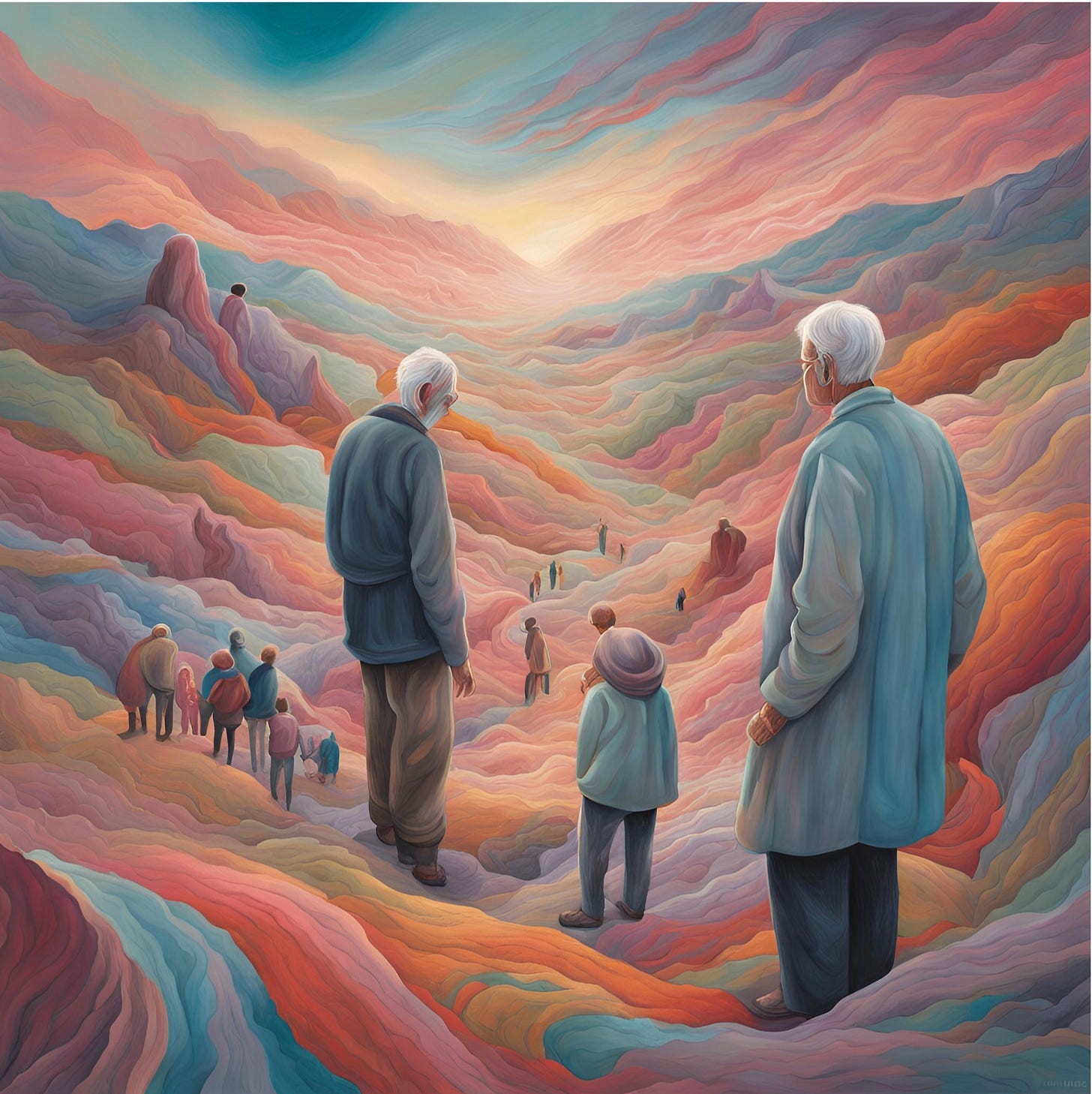Great Unraveling
finding heart in not knowing
Note to Readers: This post was initially published in January 5, 2025 on Creative Catalyst.
We regret to inform you that your intellect is dying a long, slow death;
to reverse the aging process, permit more uncertainty.
~ Antero Alli
Recently, I became my mother’s caregiver. She has dementia.
Caring for my mom these last five months, I’ve noticed that some qualities and capacities of her selfhood have vanished without her apparent awareness or concern. Yet other aspects of her “former self” are not relinquished so peaceably. My mother’s struggle is a daily reminder that whatever I cling to becomes my jailer.
A tight grip on anything creates suffering.
Statistics forecast a tsunami of dementia as baby boomers continue to age. This enormous loss of individual cognition is happening parallel to our collective loss of countless things we’ve used to define ourselves and create a sense of continuity. Long-held customs and institutions are crumbling. Faith in leaders and governing bodies is deteriorating. Things we once believed or took for granted have lost prior meaning.
The world as we’ve known it is unraveling.
The rising wave of dementia is occurring within a generation that, in their youth, largely strove for freedom and challenged traditions. They heralded a change in the status quo and the dawning of the Age of Aquarius. That celestial tide change has finally arrived. Although it was prophesied in utopian terms, I’ve come to view it as a collective transformation from mind-dominant reality (Piscean Age) to heart-centered reality (Aquarian Age).
Given the cosmic forces at play, it would behoove us to heed the warning of avant-garde artist and astrologer, Antero Alli: We regret to inform you that your intellect is dying a long, slow death; to reverse the aging process, permit more uncertainty. This is easier said than done. Surrendering to a death process and accepting uncertainty is no small feat, especially if we’ve been raised to fear death and mistrust what we cannot comprehend.
The label terminal agitation refers to a set of symptoms—emotional distress, confusion, cognitive failure, anxiety, paranoia, restlessness, aggression—that can arise in the dying process. It seems to me that dementia itself is an achingly prolonged experience of terminal agitation.
In this time of collective unraveling, humanity as a whole appears to be in the throes of terminal agitation. We are in this process together, yet each of us must undergo a psychological death as individuals. One way or another, we must let go of outmoded ways of being in order to birth a new experience of reality.
Psychological death can come through physical illnesses or crisis. It can be catalyzed through spiritual practices and plant medicines. Any life altering experience can bring about the dissolution of a former self. Dissolution is necessary for transformation.
When our mental notions of self are not the source of our stability and continuity, the heart’s coherence can be recognized as trustworthy. If we’ve lived as if our minds are the center of the self, trusting our hearts may seem dangerous. Losing a familiar identity can be terrifying. Especially if we’ve not consciously chosen to do so. Therefore, some spiritual traditions encourage us to die before we die. The wisdom in this teaching is more apparent to me now.
Witnessing my mother’s unraveling, I reflect on my own. In the last two decades, my perceptions of myself and my place in the world have been unwinding. Former ways of identifying and validating myself—career, financial status, social engagement, cultural relevance—have quietly dissolved. Turning inward more deeply, cultivating a new relationship with my heart, I recognize that I’ve relinquished many old ideas about myself, about others, and about what’s possible. I’m sometimes surprised to discover that my desires and my thoughts about what constitutes a good life have changed.
My metamorphosis will surely continue.
Caregiver was never part of my identity, but now it’s my full-time job. One that’s more demanding than I could have imagined. At some point nearly every day I notice myself struggling, shadowboxing some aspect of my current reality. It’s an emotional and spiritual workout to let myself be changed.
Living with and tending to my mother, my felt sense of being a daughter is changing. The vastness of our sacred entanglement is palpable, sometimes painful, yet exquisite and mysterious. My time spent alone, once abundant and often squandered, is now fleeting and savored. Every day I’m aware of our mutual vulnerability and the preciousness of every relationship that makes living together both possible and tolerable. It’s not so easy these days to take for granted the gift of my partner, Stephen, or my friends, or a community of individuals and organizations who offer us a variety of supports.
Every day I bear witness to the sometimes excruciating difficulty of my mother’s unraveling and am humbled by my own. Yet I also witness a surprising beauty and tenderness that remain when neither of us is grasping for what was and we can instead relax into the experience of what is. Doing so makes space for what we are becoming.
If this post has touched something in you, please share it.


